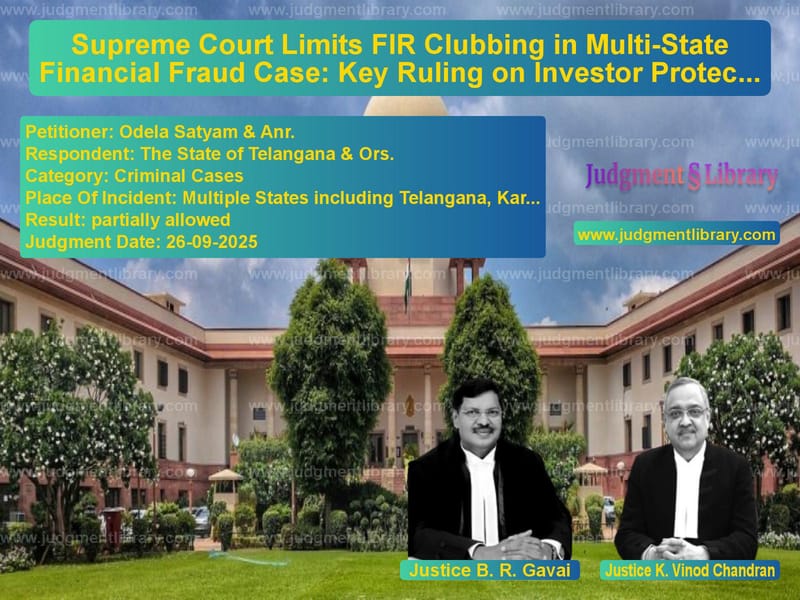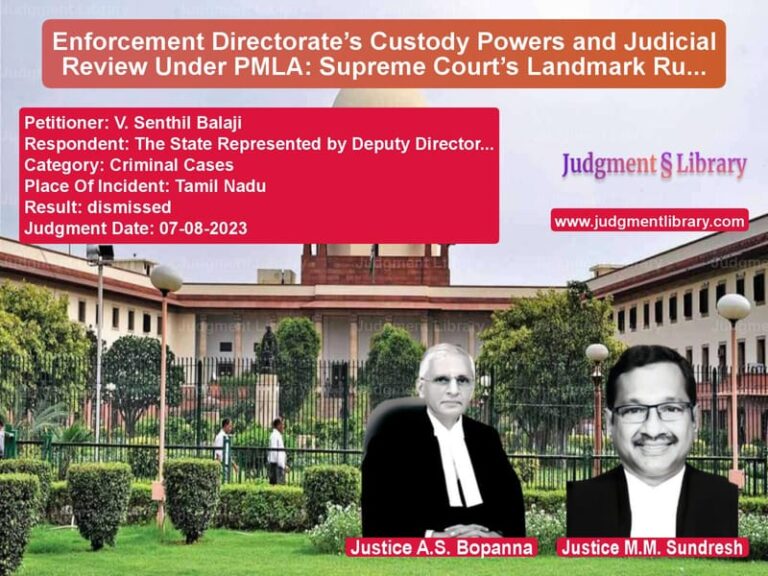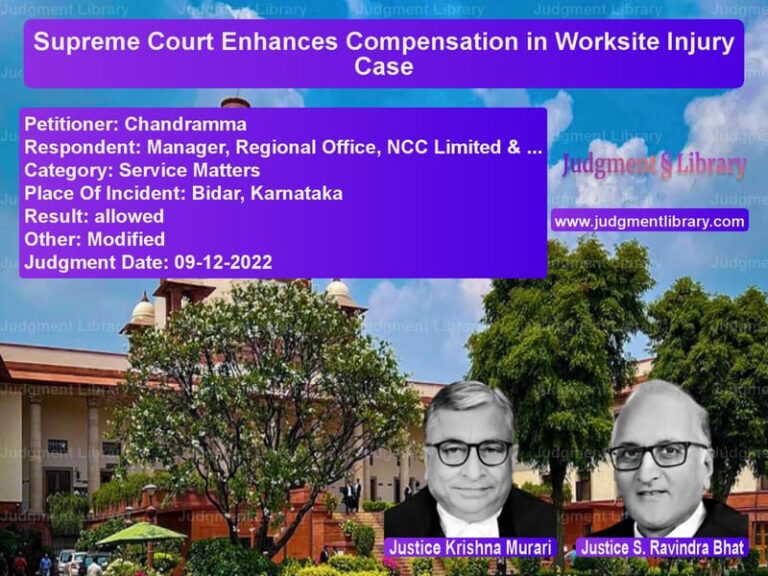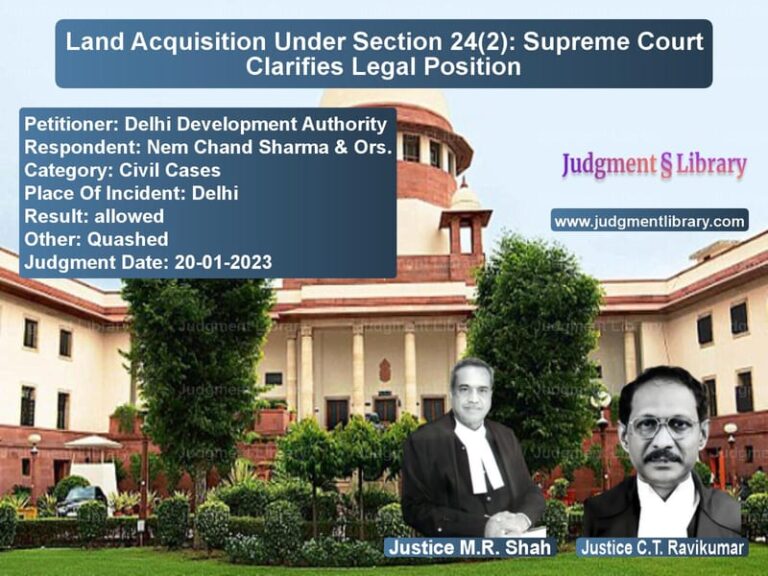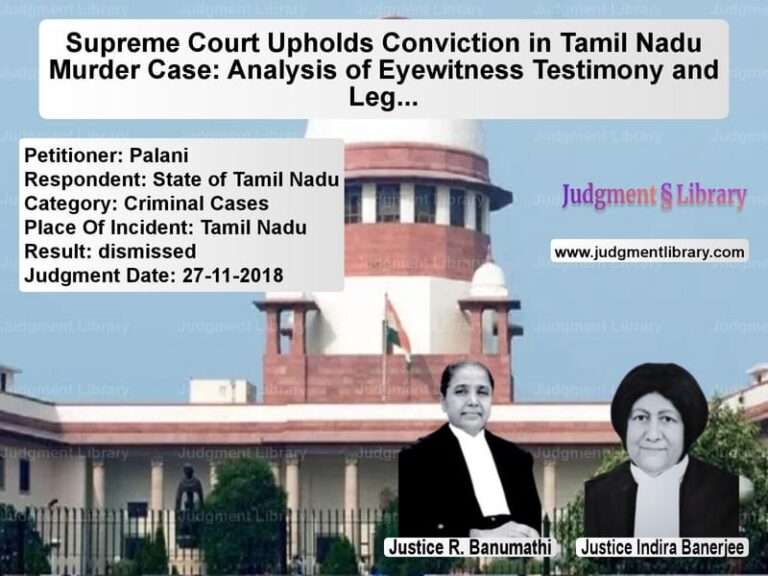Supreme Court Limits FIR Clubbing in Multi-State Financial Fraud Case: Key Ruling on Investor Protection
In a significant judgment addressing the complex legal landscape of multi-state financial fraud cases, the Supreme Court of India recently delivered a nuanced ruling on the clubbing of FIRs registered across different states. The case involved a financial firm accused of defrauding investors through a widespread investment scheme, with complaints filed in multiple states by victims who lost their life savings.
The legal battle began when the management and family members of Falcon Invoice Discounting Firm approached the Supreme Court seeking clubbing of all FIRs registered against them across seven states – Telangana, Karnataka, Maharashtra, West Bengal, Delhi, Andhra Pradesh, and Rajasthan. The petitioners argued that since the alleged crime involved the same modus operandi and the same company, all cases should be consolidated and investigated from a single police station to ensure coordinated investigation and avoid multiplicity of proceedings.
The Petitioners’ Arguments and Relief Sought
The petitioners, including Odela Satyam and others representing the firm’s management, contended that multiple FIRs had been lodged on the very same cause of action. They argued that “the investigation and prosecution has to be brought under one roof, which would be enabled by clubbing all the FIRs to one single Police Station where the first crime was registered.” The petitioners also sought an extraordinary relief – clubbing of future FIRs that might be filed against the firm, its partners, and management officials.
They relied on previous Supreme Court decisions, particularly Radhey Shyam v. State of Haryana, where similar relief had been granted, and Amish Devgan v. Union of India, where multiple FIRs concerning a television broadcast had been consolidated.
The State’s Resistance and Legal Position
The State of Telangana, where the maximum number of crimes were registered by the Economic Offences Wing in Cyberabad, strongly resisted the petitions. The state argued that while the modus operandi might be similar, “the crimes were committed by the accused in different places of the country, though the allegation is same, of defalcation of money received from unsuspecting investors.” The state emphasized that “the essential facts are different, and the individual crime proper has ramifications which are unique in each such transactions.”
Furthermore, the state pointed out that different states had invoked their own investor protection laws, such as the Telangana Protection of Depositors of Financial Establishments Act, 1999, which added another layer of complexity to simply clubbing all cases together.
Supreme Court’s Legal Analysis and Precedents
The Supreme Court bench comprising Chief Justice B.R. Gavai and Justice K. Vinod Chandran delivered a comprehensive judgment that carefully balanced the rights of the accused with the interests of justice for the victims. The Court immediately rejected the most ambitious prayer, stating that “the prayers made in the Writ Petition for clubbing of FIRs from various States and also regarding the future FIRs are overambitious and outright illegal.”
The Court referenced Amandeep Singh Saran v. State of Delhi, noting that “The prayer regarding future FIRs is one which cannot be granted by any court of law.” Regarding the reliance on Radhey Shyam, the Court clarified that “The power exercised under Radhey Shyam was under Article 142 of the Constitution of India that too with the consent of the States.”
The Court distinguished the present case from Amish Devgan, noting a crucial difference: “It has to be noticed that therein, the offence was one, of an alleged objectionable statement leading to hurting of religious sentiments telecast in a television show; which stands distinct from the instant case wherein FIRs were registered on the complaints of the investors of depositors who were alleged to have been duped by the firm diverting the funds leading to loss of their life’s savings.”
The Court emphasized the practical difficulties in clubbing cases involving financial fraud across multiple states: “We cannot forget that after investigation if a charge sheet is filed, the trial will have to be proceeded with, producing witnesses, being the investors of depositors, from the various locations. In which event the clubbing of FIRs from all the States would not be practical.”
The Court’s Limited Consolidation Order
While rejecting the broad request for nationwide consolidation, the Court exercised its discretion to allow limited consolidation within states where multiple FIRs had been registered. The Court ordered that “the FIR registered in Madhapur, Cyberabad will stand transferred to Economic Offences Wing, Cyberabad” in Telangana, and similarly, “The FIR 210 of 2025 registered in Wagle Estate, Thane City will be transferred to Ambazari, Nagpur City” in Maharashtra.
However, the Court explicitly “rejected” the clubbing of single FIRs filed in Karnataka, West Bengal, Delhi, Andhra Pradesh, and Rajasthan, recognizing that each involved distinct victims, transactions, and potentially different legal provisions under state-specific investor protection laws.
Protection for Accused and Witnesses
In a significant relief to the accused, the Court noted that “some of the petitioners are under arrest and are languishing in jail.” Considering their prolonged detention, the Court directed that “they shall be released on bail on such conditions imposed by the Jurisdictional Magistrate, including that of cooperation in the investigation.” Others facing arrest warrants were granted protection from arrest for six months to enable them to seek regular bail from jurisdictional courts.
The Court also showed sensitivity toward the victims and witnesses, directing that “if and when the trial commences, witnesses from the prosecution, if travelling from the police station limits in which the FIR was originally registered to the Court having jurisdiction over the Police Station to which it has been transferred by this order, then necessarily the Court trying the case shall award costs to defray the expenses of travel and residence.” These costs were to be borne by the accused.
Broader Legal Implications
This judgment establishes important legal principles regarding the consolidation of criminal cases across jurisdictions. It reaffirms that while courts have the power to consolidate cases for efficiency and to prevent harassment, this power must be exercised judiciously, considering the practical realities of trial proceedings and the rights of all stakeholders – accused, victims, and investigating agencies.
The ruling particularly emphasizes that in financial fraud cases involving multiple victims across different states, complete consolidation may not be feasible or desirable. Each case involves distinct victims, separate transactions, and potentially different legal frameworks under state-specific laws designed to protect investors.
The judgment also demonstrates the Supreme Court’s careful balancing of competing interests – ensuring that accused persons are not unduly harassed by multiple proceedings while simultaneously protecting the rights of victims to have their cases heard in appropriate jurisdictions where the offenses occurred and where they reside.
This decision will serve as an important precedent for future cases involving multi-state financial frauds, providing clarity on when consolidation of cases is appropriate and when the interests of justice require maintaining separate proceedings in different jurisdictions.
Petitioner Name: Odela Satyam & Anr..Respondent Name: The State of Telangana & Ors..Judgment By: Justice B. R. Gavai, Justice K. Vinod Chandran.Place Of Incident: Multiple States including Telangana, Karnataka, Maharashtra.Judgment Date: 26-09-2025.Result: partially allowed.
Don’t miss out on the full details! Download the complete judgment in PDF format below and gain valuable insights instantly!
Download Judgment: odela-satyam-&-anr.-vs-the-state-of-telanga-supreme-court-of-india-judgment-dated-26-09-2025.pdf
Directly Download Judgment: Directly download this Judgment
See all petitions in Fraud and Forgery
See all petitions in Bail and Anticipatory Bail
See all petitions in Money Laundering Cases
See all petitions in Cyber Crimes
See all petitions in Judgment by B R Gavai
See all petitions in Judgment by K. Vinod Chandran
See all petitions in partially allowed
See all petitions in supreme court of India judgments September 2025
See all petitions in 2025 judgments
See all posts in Criminal Cases Category
See all allowed petitions in Criminal Cases Category
See all Dismissed petitions in Criminal Cases Category
See all partially allowed petitions in Criminal Cases Category

